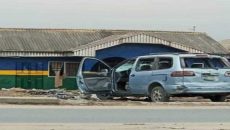The education policy of the Delta State government is designed to produce human capital that would be a catalyst for the socio-economic development of the state
For the academic staff of the Delta State University, DELSU, the year 2013 was an exceptionally good one. A sum of N150 million earmarked as car loan for the lecturers upgraded their status to car owners, restoring a feeling of self-worth and importance to the advancement of the educational sector in the state. This is a follow up to the implementation of the wage increase and attractive welfare package signed by the federal government with the Academic Staff Union of Universities, ASUU, at the state level. A shower of grants to many of the state-owned tertiary institutions has facilitated overseas training for the lecturers. Teachers across the primary and secondary schools in Delta State have also benefitted in the training and retraining program of the Emmanuel Uduaghan’s administration. Also, there has been a massive intervention in the award of bursary to Delta State indigenes as well as scholarship schemes for deserving students in the state.
For instance, N514 million was expended on bursary scheme in 2009. In 2010, it jumped to N585 million. In 2012 a sum of N610 million was disbursed under the scholarship scheme. Also, 197 Delta State indigenes have benefitted from the First Class Scholarship Scheme of the state government. Each student accessed N5 million to advance their studies at the master’s and PhD levels.
Theodora Ogharanduku was one of the beneficiaries of the First Class Scholarship Scheme. Prior to the introduction of the scheme, Ogharanduku, a lecturer at the DELSU, Abraka, said no one had any confidence that a state government could help its best brains to further their studies. “As at the time the scheme was introduced, a lot of people were sceptical because they said anything that has to do with government, you never can tell. But funny enough, we didn’t know anybody and I know a lot of people who had never been to Delta State who benefitted, yet they didn’t know anybody,” she said. Today, courtesy of a focused state government who believes in developing the capacity of its indigenes, Ogharanduku is a proud recipient of a master’s degree from the London School of Hygiene and Tropical Medicine, University of London. She is elated that Uduaghan’s intervention has saved her from years of saving and scrimping. “Without the scholarship, I wouldn’t have been able to afford it. I would have had to save my salaries for like 10 years,” she declared very frankly.
The seeming fixture on manpower development in the education sector in Delta State is not an accident. It is a well thought-out and deliberate plan of the state government to ensure a committed workforce that will drive the desired change in the education sector vis-à-vis the larger society. Of the three-point agenda of the state government, Uduaghan admits that human capital development is crucial. “If you look at our three-point agenda – peace and security; infrastructure development and human capital development, yes, they are inter-woven; our human capital development is very important. And the anchor for human capital development is education.”
There is no doubt that the medical doctor turned politician is bent on overhauling the education sector. Under his administration, comprehensive renovation of school buildings, and construction of new structures with added modern facilities like the science laboratories, information communication technology, ICT, laboratories, football pitches, basketball courts, sick bays and conveniences have sprouted across all the zones in the state. But these interventions have roots in Uduaghan’s aggressive approach to manpower development. More than 5,000 teachers and about 2,000 non-academic staff have been employed to boost the staff strength in primary and secondary schools in the state so far. There is more. Students from Delta State studying in any part of the country are entitled to N20,000 each under the Student Special Assistance Scheme, known as bursary. According to Hope Eghagha, Commissioner for Higher Education, Delta State students attend more than 160 tertiary institutions across Nigeria a statistics that was made possible by its scholarship schemes.
Accessing the bursary fund is not rocket science. Peter Amromanoh, Executive Secretary, Delta State Bursary and Scholarship Board, said “once you are a Deltan and you are in the university, you are entitled to N20,000 as bursary…but you must have a CGPA ( Cumulative Grade Point Average) of 2.2 and above to qualify. Like I said, you must be a Deltan and in a university in Nigeria.”
The scheme is not only about undergraduates. Students from Delta State who are attending any Law school in the country are entitled to N100,000 each. Government has also made a N3 million provision for each student going for his or her master’s programme. Another N3 million is available for each year of the PhD programme. But it is a bumper package for first class students. Each beneficiary gets N5 million to start his or her master’s programme and subsequently gets N5 million for each year of the PhD programme. A thoughtful extension of the scholarship scheme is the provision for children of deceased civil servants. As a governor who recognises the importance of education to the development of individuals, communities and nations, Uduaghan has ensured that the death of any civil servant does not mark an end to the academic pursuit of his or her children. In a philanthropic gesture, the governor has mandated the Bursary and Scholarship Board to give automatic scholarship to a maximum number of four children of such deceased civil servants.
Amromanoh seems to understand Uduaghan’s motivation for the scholarship schemes. According to the boss of the Bursary and Scholarship Board, it is this army of youths who have been provided with free tuition and equipped with world-class education that would take over the reins of governance and administration in the coming years.
“Government believes that in five years from now, these people we are sending out will come back here to repair the rot which we believe we have in the society. Their orientation will change, their value system will change and they will come back to help drive the other two agenda. If you have those things upstairs, you will not be dropping pieces of paper on the street because of where you are coming from. You will not think about fraud. If you have that value in you, you will pay your tax, because you know the value of the tax system. So, these are the things that government is trying to achieve by pumping a lot of money on this human capital agenda,” he emphasised.
Amromanoh is right. Scholarship recipients like Ogharanduku believes that her worldview has changed after her studies at the University of London. “I think that it gave a lot of us the opportunity to see the world because without the scholarship scheme, many of us wouldn’t have left the shores of Nigeria. It changed the outlook of many people because a lot of people came back with an enhanced outlook. They see things differently because I’ve had the opportunity of discussing with a lot of them. Even myself, you know when you go out there, you will see what works, how it works and why it works. It motivated a lot of people,” she said
Follow Us on Social Media


 WhatsApp us
WhatsApp us